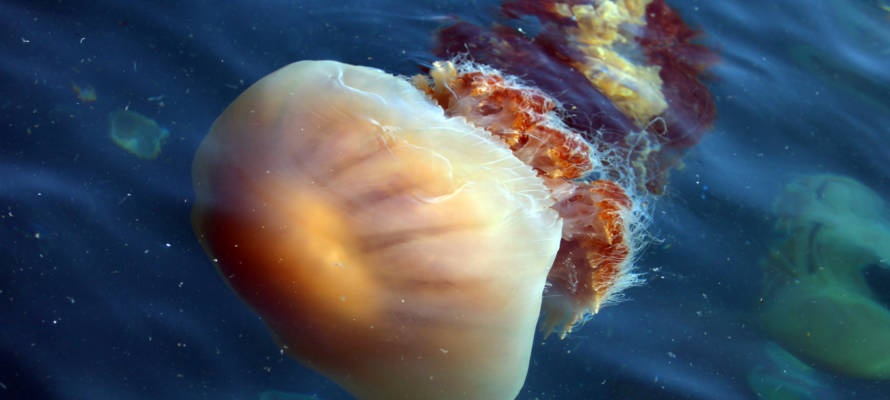“One of the outstanding observations over the past decade is that we keep finding what we consider new jellyfish in our coastal waters. Different, intriguing species keep appearing,” said Haifa University Prof. Dror Angel.
By TPS
Israel is experiencing a migration of larger than normal jellyfish this year, the University of Haifa is warning beachgoers as the yearly summer bloom approaches its peak.
University of Haifa’s Leon H. Charney School of Marine Sciences has been studying the ecology and life cycle of jellyfish along Israel’s coast. As a huge swarm of jellyfish appeared off Haifa’s coast, the university’s researchers got a close look at Israel’s all-too-familiar summer marine animals — and this year they’re larger than ever.
“Overall, this is the summer bloom of jellyfish that we anticipate, but there’s a slight difference in the size of jellyfish — on average, they’re bigger this year than in other years,” explained Professor Dror Angel.
“We had a very rainy winter this year, and the runoff that reached the sea provided a lot of nutrients that contributed to the formation of the jellyfish bloom. The nutrients feed the algae; the algae bloom and are eaten by small plankton herbivores, and these are then eaten by the jellyfish,” he added.
“Nature is the bigger player. We’re looking at cues like changes in temperature, as these probably play a role in determining when jellyfish appear. Rainy winters or more arid winters could determine the size of the bloom the following summer,” he said.
“We haven’t identified human-driven factors, like pollution, which could also be affecting the blooms. At the moment, we think natural phenomena have more of an impact than human effects.”
Regarding the school’s research on jellyfish, Angel explained that “we’re trying to understand the ecology of the various jellyfish in our coastal waters — when do the blooms appear, why are they bigger or smaller in some years, and so on. We’re also looking for missing evidence in the life cycle of the nomad jellyfish – where are certain life stages found, what eats the jellyfish and what do the jellyfish eat, how they interact with the marine system, and we are exploring the use of jellyfish as a means to reduce microplastic pollution in the ocean.”
“One of the outstanding observations over the past decade is that we keep finding what we consider new jellyfish in our coastal waters. Different, intriguing species keep appearing. Although we consider them new, it’s possible that they’ve been around and we just didn’t see them until they became more abundant. It seems that the more you look, the more you see.”

HELP ISRAELIS BATTLE CORONA!
Donate to the Corona Emergency Relief Fund. Coronavirus has taken a huge toll on the people of Israel. The poor, elderly and ill are most vulnerable.
Israeli soldiers, security officers and medical care providers operate under great danger and risk to life.
Over 1 million Israelis are out of work. Many cannot make ends meet. We provide financial aid, food, medical supplies and more. Funds are distributed where needed most. The time to act is now!
United with Israel extends a special note of appreciation to the Genesis Prize for their generous support.
CLICK HERE TO HELP THE PEOPLE OF ISRAEL TODAY!
Send Passover Packages to Needy Israeli Soldiers - Bring Them Joy!
We are honored to thank the young men and women of the IDF who risk their lives every day to protect the citizens of Israel. Since October 7th, soldiers have been on the battlefield for months - many are hoping to come home for Passover.
Join us in sending Passover food packages (and personal notes) to Israeli soldiers and their families.
Many soldiers spend the Passover holiday with needy families back home. The soldiers greatly appreciate your love and concern. Bring them Passover joy!
CLICK HERE TO SEND YOUR PACKAGE AND NOTE TO ISRAELI SOLDIERS!




